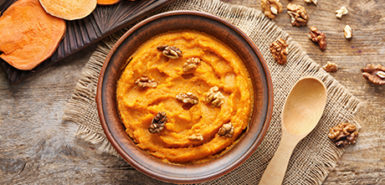
Bloating is common, especially among women.
Constipation or menstruation are the most common causes, but for many women there could also be an underlying condition.
Irritable bowel syndrome, which affects up to 24% of women, can cause an extreme sensitivity to gas, which can lead to pain, cramping and diarrhea.
Other conditions that may case bloating are adenomyosis or endometriosis, as well as ovarian cysts or fibroids.
If you experience consistent and painful bloating, you should consult your medical provider.
Here are some ways to alleviate more temporary bloating:
Tailor your diet
Consider cutting down on foods that are easily fermented in your stomach. Dietary changes are typically the first line of treatment for reducing gas and bloating.
Some foods that might be causing you to bloat: cruciferous vegetables (cauliflower, broccoli), allium vegetables (onions, garlic), leafy greens, carbonated drinks, alcohol, white flour products and lactose. Food allergies could also be the culprit.
Stretch out
Yoga seems to be a cure-all lately, but it’s true that certain poses can help with bloating—by relieving gas. Do these poses in a place you can feel completely relaxed and able to let go:
- Child’s pose. This position relaxes the hips and lower back, helping to move gas through the bowels.
- Apanasana pose (knee to chest). This is also called the wind-relieving pose, moving energy downward.
- Happy baby pose. This is named after babies who grip their toes while lying on their back. This pose relieves stress in the lower back and groin and releases gas trapped in the bowels.
Tummy rub
A simple tummy rub can work wonders. Rubbing your abdomen in a gentle, clockwise motion may help your stomach muscles relax and aid the movement of trapped gas, thereby reducing cramps and bloating.
Ditch the gum
Chewing gum can cause you to swallow excess air, which adds to bloating and distension when it’s trapped in the digestive tract. Consider swapping out your gum for a digestive aid like peppermint or ginger.
Tea time
That’s right—start your day with tea. Beginning the day with a large glass of warm water such as tea—especially teas that contain lemon, ginger or peppermint—helps stimulate digestion. It also provides relief from bloating and helps you rehydrate. Plus, it’s a cozy way to begin your day.
Overall, the key to preventing bloating is to understand its cause.
If changes in your eating habits and lifestyle remedies don’t help, talk to your provider about your symptoms.
 /a>
/a>
 /a>
/a>
 /a>
/a>